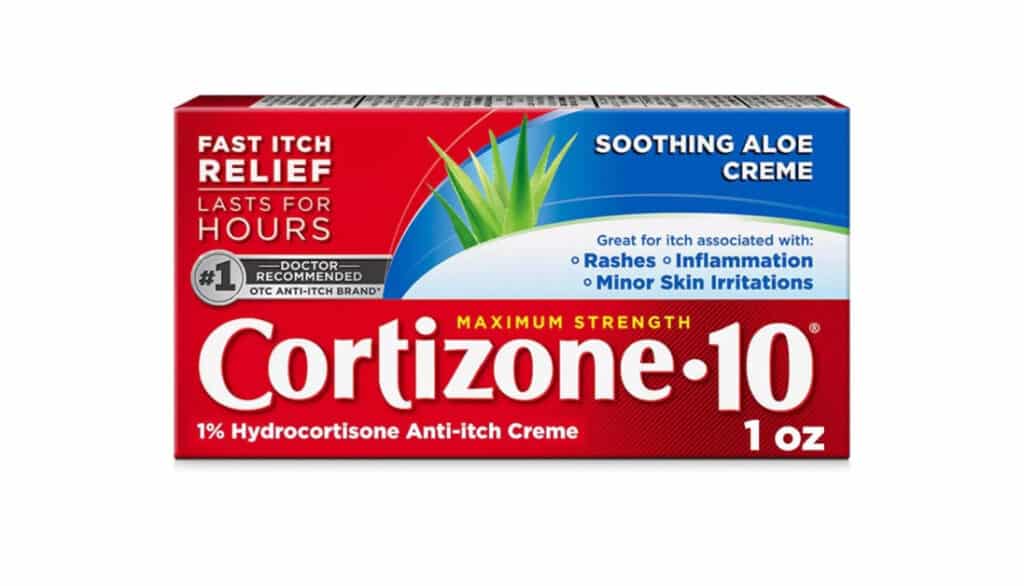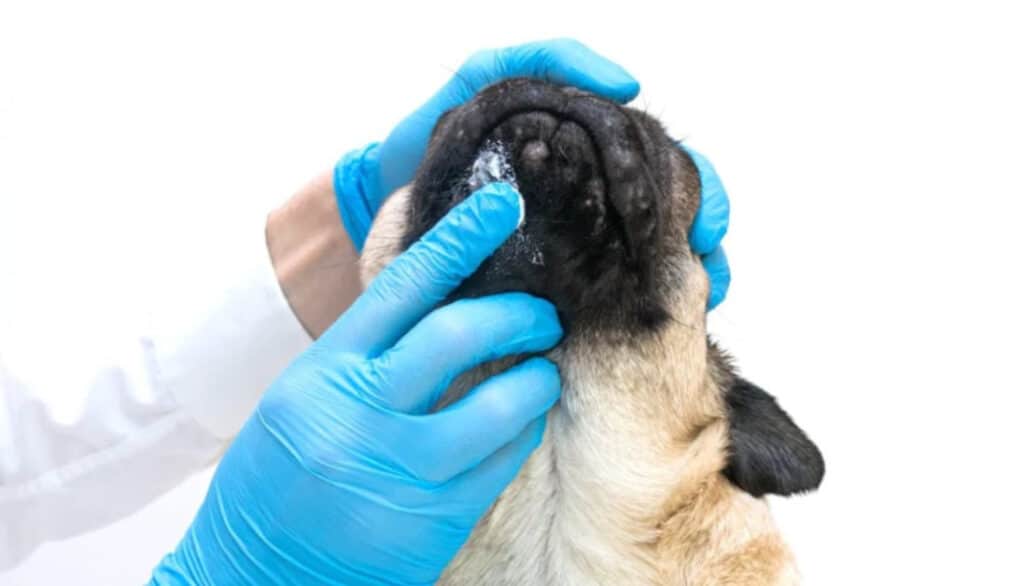Hello, fellow pet enthusiasts and concerned dog parents! As a veterinary professional, I’ve dedicated my life to understanding the intricate details of our furry companions’ health and wellness. Over the years, I’ve encountered countless pet owners who, with the best intentions at heart, turn to solutions designed for humans to alleviate their dogs’ discomforts. One such frequently debated product is Cortisone 10, a popular over-the-counter remedy known to work wonders on our own itchy or irritated skin. It’s natural to wonder: Can you use cortisone 10 on dogs? Well, you’re in the right place. In this comprehensive guide, we will dive deep into the world of Cortisone 10, its potential implications for dogs, and how we can best support our pets’ skin health. Remember, while our dogs might share our homes, hearts, and sometimes our pillows, their health needs can be quite distinct from ours. Let’s explore this topic together.

What is Cortisone 10?
If you’ve ever been through the skin care section, especially searching for a quick relief from an irritating rash or pesky itch, you’ve probably come across a tube or two of Cortisone 10. It’s almost like the superhero of over-the-counter creams for many of us. But what is it, really?
Cortisone 10 is a topical cream containing hydrocortisone, a type of corticosteroid. Without getting too science-y on you, corticosteroids are simply medications designed to reduce inflammation. Think of them as the fire extinguishers for those red, inflamed, and itchy patches on your skin. The “10” in Cortisone 10? That’s usually an indicator of the strength – it typically means the cream contains 1% hydrocortisone.
Humans have benefited from this cream for a variety of skin conditions, from eczema flare-ups to insect bites. It’s a handy little tube to have in the medicine cabinet. But just because it’s our go-to relief cream, does it mean it’s safe for our canine buddies? Stick around as we unravel this puzzle.

Why Would Someone Consider Using Cortisone 10 on Dogs?
If you’re like me, watching your dog scratch, bite, or lick a specific spot over and over can make you feel pretty desperate for a solution. And sometimes, that desperation might have you glancing at that trusty tube of Cortisone 10 you have for yourself. I mean, if it can tame our skin troubles, why wouldn’t it do the same for Fido?
Dogs, just like us, suffer from an array of skin issues. Maybe it’s that relentless summer allergy turning their skin into an itchy battlefield, the dreaded hot spots that pop up overnight, or just a mysterious rash that seems to have appeared out of nowhere. These conditions can be discomforting for our pups, and as the loyal human sidekicks we are, we naturally want to offer immediate relief.
Let’s be honest: it’s tempting. An over-the-counter solution that promises fast relief and is just a cabinet away? It sounds like an easy fix. However, the key thing to remember is that what works wonders for human skin isn’t always a good match for our dogs. Let’s delve into the details to ensure we make informed choices for our four-legged friends.
Can You Use Cortisone 10 on Dogs?
Let’s cut to the chase, shall we? You’re here, after all, for this million-dollar question. Can that little wonder tube of Cortisone 10 be used on our pooches? The short answer: it’s complicated.
While Cortisone 10, with its anti-inflammatory prowess, might seem like a lifesaver for us, the story gets a bit twisty when it comes to our furry pals. Dogs, in their lovable and curious nature, tend to lick areas that irritate them, and there lies the first hurdle. If they ingest the cream after you’ve applied it, they might experience side effects that aren’t too pleasant.
Moreover, our pets have different skin thickness and absorption rates compared to us. What might be a mild treatment for our skin could be potent and potentially risky for them. The cream’s concentration, especially when frequently applied, could lead to problems.
It’s also worth noting that not all skin irritations in dogs are created equal. What appears to be a simple rash could be a symptom of a deeper issue that an over-the-counter cream just won’t address.
So, while it might be tempting to reach for that handy tube in the hopes of giving your fur baby quick relief, it’s essential to exercise caution. In many cases, consulting with your veterinarian is the wisest and safest route. They can provide guidance on whether a product like Cortisone 10 is suitable and how to use it, or they might offer an alternative tailored just for your dog’s needs.

How Can Cortisone 10 Affect Dogs?
Alright, now that we’ve touched on the ‘can we or can’t we’ debate, let’s dive into the nitty-gritty of how Cortisone 10 might affect our dogs if we decide to play the card.
First off, let’s talk about that age-old doggy habit – licking. If I had a nickel for every time I’ve watched a dog go to town licking something they shouldn’t, I’d have… well, a lot of nickels! So, imagine you dab a bit of Cortisone 10 on your dog’s skin. There’s a high chance they’ll be curious about this new substance and try to lick it off. If ingested, hydrocortisone can lead to upset stomachs, increased thirst, more frequent urination, and in more severe cases, internal complications. Not exactly the relief we were aiming for, right?
Then there’s the topical aspect. Dog skin isn’t the same as human skin. It’s more delicate and susceptible in many ways. Applying a strong human-grade cream can sometimes lead to further irritation or an allergic reaction. Signs to watch out for might include increased redness, swelling, or even more itching. That’s the opposite of what we’re trying to achieve!
Moreover, frequent use can lead to thinner skin, making it more prone to injuries. And there’s also the risk of systemic absorption, especially if applied to large areas or open wounds. This could affect internal organs over time.
It’s a tricky road to navigate. While we’re all for DIY solutions and home remedies, there are times when it’s crucial to step back and trust the professionals. If you’re contemplating using a product like Cortisone 10 on your pup, it’s always a good idea to dial up your vet and have a little chat first. They’ve got the roadmap to ensure our pets are safe, comfortable, and itch-free!
Safe Alternatives for Dog Skin Issues
We’ve all been there, haven’t we? Watching our fur-babies scratch away or looking distressed with a skin issue is enough to make any dog parent search high and low for remedies. But as we’ve discussed, not every human solution is dog-friendly. So, what are the safer alternatives to alleviate our dogs’ skin woes? Fear not! I’ve rounded up some tried-and-true methods and treatments. And yes, we’re going to make it fun with a little list action and even a table or two.
1. Vet-Approved Topical Treatments:
- Calendula Gel or Cream: A natural anti-inflammatory and healing agent. Perfect for minor irritations.
- Aloe Vera Gel (100% pure): Cooling and soothing, but make sure it’s the pet-safe kind without added alcohol or fragrance.
- Vet-prescribed Corticosteroid Creams: These are formulated specifically for dogs, ensuring the right concentration and safety profile.
2. Natural Remedies:
- Oatmeal Baths: Grandmother’s remedy for itchy skin and guess what? It works wonders for dogs too! Just ensure the oatmeal is finely ground.
- Coconut Oil: A little dab of this natural moisturizer can soothe dry patches. Plus, it’s safe if they lick a little.
- Chamomile or Green Tea Rinses: Brewed tea (cooled, of course) can be a gentle rinse for irritated skin, offering relief from itching.
3. Dietary Solutions:
Increasing Omega-3 fatty acids in your dog’s diet can help alleviate skin issues from the inside out. Supplements like fish oil capsules or flaxseed oil can make a difference.
4. Over-the-Counter Dog-Specific Solutions:
| Product | Usage | Notes |
|---|---|---|
| Dog-Specific Hydrocortisone Cream | For minor itches and irritations | Always follow label directions |
| Hypoallergenic Shampoos | For dogs with sensitive skin | Look for ones with aloe vera or oatmeal |
| Antihistamine Creams | For allergic reactions | Ensure it’s dog-friendly and vet-recommended |
5. Professional Check-ups:
Sometimes, the best solution is a professional assessment. Regular check-ups or visits when an issue first appears can nip problems in the bud. Remember, some skin issues can be a sign of underlying health problems.
As we navigate the world of dog skincare, it’s essential to remember: our pets’ health is unique. While it’s great to be hands-on and proactive, always consult with a vet before introducing new treatments, especially if you’re uncertain. After all, our goal is a happy, itch-free tail-wagging companion!

Conclusion
Well, there we have it, dear fellow dog lovers! We’ve journeyed together through the maze of canine skin care, delved into the tempting world of human remedies, and emerged with some paws-itively great alternatives tailor-made for our four-legged buddies. The path to understanding what’s best for our pets can sometimes be as twisty as a dog chasing its tail, but the end game is always the same: ensuring their utmost comfort and well-being.
At the heart of it all, remember this: our dogs might not speak our language, but the trust they place in us speaks volumes. It’s our privilege and responsibility to ensure they live their best, itch-free lives. If ever in doubt, always let the professionals lead the way. After all, the vet knows best! Here’s to happy, healthy pets and the humans who adore them. Until our next adventure together, give your pup an extra belly rub from me. Stay curious and keep those tails wagging!
Frequently Asked Questions (FAQs)
While a small amount might not cause immediate harm, ingestion of corticosteroids like those in Cortisone 10 can lead to side effects such as increased thirst, frequent urination, and gastrointestinal upset. In larger quantities, there could be more severe internal complications. If you suspect your dog has ingested a significant amount, contact your vet immediately.
Not all over-the-counter creams are safe for dogs. Many contain ingredients that can be harmful if ingested or can cause skin irritations. Always consult your veterinarian before applying any human product to your dog.
Oatmeal baths can be a soothing remedy for dogs with itchy skin. Depending on the severity of the itchiness, once to twice a week is generally sufficient. However, always ensure the oatmeal is finely ground and remember to rinse your dog thoroughly after the soak.
If you’ve tried home or natural remedies and there’s no improvement (or the condition worsens), it’s essential to consult a veterinarian. Persistent skin issues can be a sign of underlying health problems or might require more potent treatments.
While dog-specific solutions are formulated with canine health in mind, all dogs are unique, and there’s always a potential for individual reactions. It’s always a good practice to monitor your dog after introducing a new treatment and consult your vet if you notice any adverse reactions.
